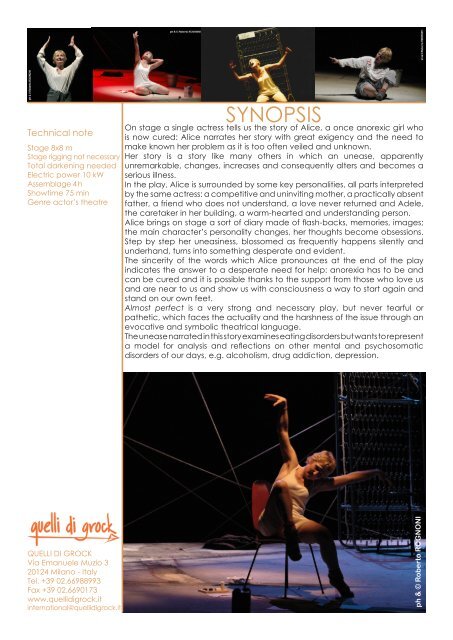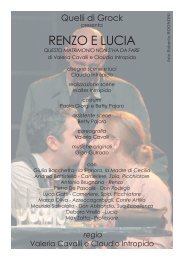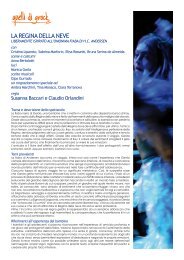Quelli di Grock with collaboration of ABA presents Quelli di Grock ...
Quelli di Grock with collaboration of ABA presents Quelli di Grock ...
Quelli di Grock with collaboration of ABA presents Quelli di Grock ...
You also want an ePaper? Increase the reach of your titles
YUMPU automatically turns print PDFs into web optimized ePapers that Google loves.
Technical note<br />
Stage 8x8 m<br />
Stage rigging not necessary<br />
Total darkening needed<br />
Electric power 10 kW<br />
Assemblage 4 h<br />
Showtime 75 min<br />
Genre actor’s theatre<br />
QUELLI DI GROCK<br />
Via Emanuele Muzio 3<br />
20124 Milano - Italy<br />
Tel. +39 02.66988993<br />
Fax +39 02.6690173<br />
www.quelli<strong>di</strong>grock.it<br />
international@quelli<strong>di</strong>grock.it<br />
SYNOPSIS<br />
On stage a single actress tells us the story <strong>of</strong> Alice, a once anorexic girl who<br />
is now cured: Alice narrates her story <strong>with</strong> great exigency and the need to<br />
make known her problem as it is too <strong>of</strong>ten veiled and unknown.<br />
Her story is a story like many others in which an unease, apparently<br />
unremarkable, changes, increases and consequently alters and becomes a<br />
serious illness.<br />
In the play, Alice is surrounded by some key personalities, all parts interpreted<br />
by the same actress: a competitive and uninviting mother, a practically absent<br />
father, a friend who does not understand, a love never returned and Adele,<br />
the caretaker in her buil<strong>di</strong>ng, a warm-hearted and understan<strong>di</strong>ng person.<br />
Alice brings on stage a sort <strong>of</strong> <strong>di</strong>ary made <strong>of</strong> flash-backs, memories, images;<br />
the main character’s personality changes, her thoughts become obsessions.<br />
Step by step her uneasiness, blossomed as frequently happens silently and<br />
underhand, turns into something desperate and evident.<br />
The sincerity <strong>of</strong> the words which Alice pronounces at the end <strong>of</strong> the play<br />
in<strong>di</strong>cates the answer to a desperate need for help: anorexia has to be and<br />
can be cured and it is possible thanks to the support from those who love us<br />
and are near to us and show us <strong>with</strong> consciousness a way to start again and<br />
stand on our own feet.<br />
Almost perfect is a very strong and necessary play, but never tearful or<br />
pathetic, which faces the actuality and the harshness <strong>of</strong> the issue through an<br />
evocative and symbolic theatrical language.<br />
The unease narrated in this story examines eating <strong>di</strong>sorders but wants to represent<br />
a model for analysis and reflections on other mental and psychosomatic<br />
<strong>di</strong>sorders <strong>of</strong> our days, e.g. alcoholism, drug ad<strong>di</strong>ction, depression.<br />
ph & © Roberto ROGNONI





![scarica PDF [790 KB] - Quelli di Grock](https://img.yumpu.com/16084351/1/184x260/scarica-pdf-790-kb-quelli-di-grock.jpg?quality=85)
![scarica PDF [813 KB] - Quelli di Grock](https://img.yumpu.com/15828495/1/184x260/scarica-pdf-813-kb-quelli-di-grock.jpg?quality=85)

